With the strong demand for big data and advanced analytics, the role of a data engineer has become increasingly significant.
Numerous companies from every industry require specialists with their technical data engineering skills to design, build and maintain data infrastructure to facilitate the availability of data for business analysts or data scientists.
Working as a data engineer can be challenging and requires a deep understanding of numerous advanced technologies. However, that makes being a data engineer an unsurprisingly lucrative career.
According to Indeed, average data engineers earn as high as $125,335 per year in the US. Furthermore, their earnings are trending higher, as demand for such specialists will skyrocket in the future.
To excel in data engineering, you can take high-quality online courses to begin your journey. These courses will equip you with foundational data engineering knowledge to help you get a job at leading tech companies.
Unfortunately, not all online data engineering courses are worth taking. Some courses are low-quality and can be detrimental to your progress.
Thus, this post will feature only the best data engineering courses that I found beneficial in building your skills. You can then handily select the one that suits your learning style and skill level and start learning right away.
Affiliate Disclosure: This post from Victory Tale contains affiliate links. If you purchase a data engineering course through them, we will receive a small commission from its providers.
Nonetheless, we always value integrity and prioritize our audience’s interests. You can then rest assured that we will present each course truthfully.
Things You Should Know
Below are things that I believe you should know before making decisions.
Prerequisites
For most beginner courses, you can start learning data engineering right away without the need for prior knowledge or experience in programming or IT skills.
However, some data engineering courses are not for absolute beginners. You will need background knowledge in the following.
- Python Programming
- Data Structures & Algorithms
- SQL
- Linear Algebra
Some courses might have specific prerequisites. I will inform you below if any courses do.
This post will feature both types of courses. I will start with beginner courses and move on to advanced counterparts later. Suppose you already understand fundamental data engineering or data science concepts. You might want to enroll in one of the advanced courses right away.
Criteria
Below are my criteria for the best data engineer courses.
- Credible Instructor with years of experience in the data engineering field
- User-friendly platform
- Excellent course materials
- Offer hands-on experience
- Provide excellent value for money
- Positive reviews from real students
- My personal experience with the course or the platform (if any) has to be positive.
Beginner Courses
1. IBM Data Engineering Professional Certificate
This Coursera Professional Certificate program is the best option to learn data engineering for absolute beginners. You will learn from more than a dozen top-notch IBM experts who have years of experience in data engineering.
Important Note: According to the official sales page, this program has no prerequisites. However, user reviews and my personal experience with the program indicate otherwise. It would be best if your Python skill is at least lower intermediate before taking the course.
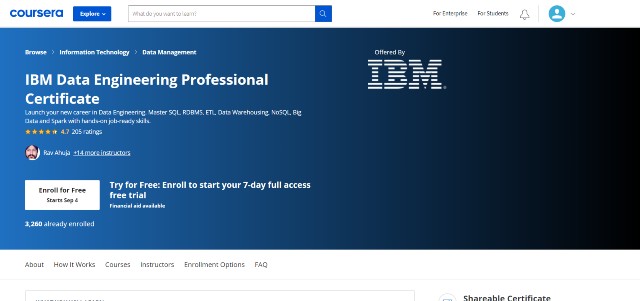
Course Content
The program consists of 13 minor courses as follows:
1. Introduction to Data Engineering – The first course will introduce you to the current data engineering ecosystem and its lifecycle. Furthermore, you will perceive the relationship among data engineers, data analysts, and data scientists and grasp their roles in the ecosystem.
2. Python for Data Science, AI & Development – The second course is a Python tutorial. You will learn to code in Python and understand programming concepts that will prove beneficial for learning data science and machine learning.
3. Python Project for Data Engineering – Unlike the two previous courses, this one functions as a project that will provide you with valuable hands-on experience.
You will create a web scraper and extract data with APIs. Upon project completion, you will be confident in collecting datasets and transforming them for further usage.
4. Introduction to Relational Database (RDBMS) – This course will explain fundamental concepts of RDBMS and data models. You will understand its benefits in data management and handily apply them to your data.
Regarding relational databases, you will be using MySQL, PostgreSQL, and IBM DB2, all of which are industry.
5. Databases and SQL for Data Science with Python – The fifth course will drill deep into SQL. You will grasp how data engineers use it to communicate and extract data from databases.
6. Introduction to NoSQL Databases – NoSQL is a type of database that has become immensely popular in big data and web applications recently. You will first learn the basics, including its unique characteristics and benefits.
Later on, you will explore the architecture of various NoSQL databases, such as MongoDB and Cassandra, and use them to perform data engineering tasks.
7. Introduction to Big Data with Spark and Hadoop – The 21st century is a big data world. This course will then explain the characteristics of big data and its application in data analytics.
Subsequently, you will be introduced to big data tools such as Apache Spark, Hadoop, and Hive (a data warehouse software)
8. Data Engineering and Machine Learning Using Spark – The eighth course will provide an overview of using Apache Spark in data engineering and machine learning applications. You will then work with Spark MLlib to perform ETL and other vital tasks.
9. Hands-on Introduction to Linux Commands and Shell Scripting – The ninth course is a concise tutorial on Linux shell commands and shell scripting. Both help you automate various tedious tasks.
10. Relational Database Administration (DBA) – In essence, you will learn how to manage databases in this course. You will grasp methods and best practices to configure, upgrade, monitor, maintain, and secure your database.
11. ETL and Data Pipelines with Shell, Airflow, and Kafka – The eleventh course is a deep dive into the two approaches specialists transform raw data into processed data ready for further data analysis.
These two approaches are ETL (apply to data warehouses) and ELT (apply to data lakes). The instructor will explain how they are different and identify their optimal use cases.
12. Getting Started with Data Warehousing and BI Analytics – The twelfth course will drill deep into data repositories, particularly data warehouses. Subsequently, you will learn about business intelligence analytics and gain hands-on experience by using IBM Cognos.
13. Capstone Project – The final course functions as a project. You will use all the knowledge you have learned throughout the program. You will assume the role of a data engineer and provide relevant solutions to a virtual organization
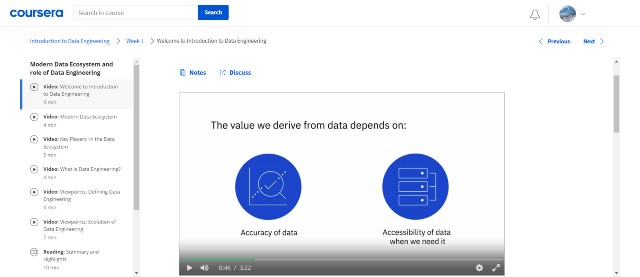
From an overall perspective, you will start with the essentials and proceed to advanced, cutting-edge concepts at the end of the program. Thus, based on my research, this program is unarguably the most comprehensive data engineering training apart from data science bootcamps.
You can audit the entire program for free. However, as this course has numerous projects to complete, I recommend enrolling in the full program to receive valuable feedback to ensure that you are on the right track.
The pricing for this program is $49 per month, thus perfectly affordable compared to data science bootcamps that cost tens of thousands of dollars.
Pros and Cons
Pros
- Beginner-friendly: You will learn all the concepts from the beginning
- Comprehensive and well-structured learning path (from basic to advanced in one program)
- Learn from leading IBM experts
- In-depth lessons with clear explanations of data engineering concepts
- Numerous hands-on projects to gain real-world experience: You will work with actual databases and massive datasets
- Affordable Pricing
Cons
- Time-consuming: The suggested pace (3 hours per week) is too slow. Hence, you will need approximately ten months to complete the entire program.
- Some students encountered technical issues in some parts of the course. This is because IBM reuses some of its content from a previous specialization it created earlier on Coursera. Thus, some of them are outdated and need a fresh update.
- Numerous reviewers believe the Python tutorial that IBM provided is insufficient.
2. Datacamp’s Data Engineer with Python Career Track
Datacamp is an online school that offers a unique approach to data science in general. Instead of learning through boring videos and dull walls of text, you will learn data engineering from Datacamp’s interactive learning platform.
I found Datacamp’s course to be one of the most beginner-friendly. You don’t need any background knowledge at all.
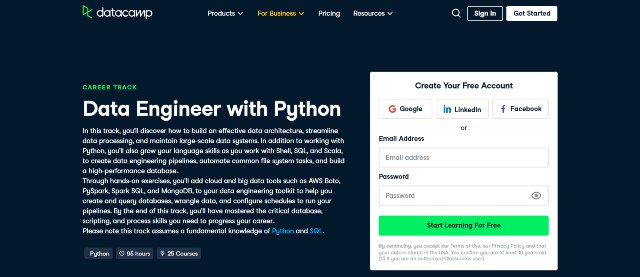
Course Content
Datacamp is a platform exclusively for data science learning. You can select from hundreds of courses to start your journey. However, it would be best if you start with a career track created particularly for data engineering.
This “Data Engineer with Python” career track comprises 25 courses (95 hours of content in total). Below is a summary of the content you will learn from these courses.
1. Data Engineering Fundamentals – You will learn about the role of data engineers in the ecosystem and grasp the foundational concepts.
2. Python Programming – You will learn to code in Python in detail, from data types and syntaxes to writing functions and object-oriented programming.
3. SQL – You will learn about relational databases in SQL and how to perform vital tasks, including data cleaning, transactions & data handling, triggers implementation, and optimizing queries.
4. Shell and Data Processing – You will understand how to use the UNIX command line to transform various data tasks (i.e., data transformation), automate repetitive tasks, and run programs on the cloud infrastructure.
5. PySpark – You will learn to use the PySpark package in numerous tasks, particularly big data analytics and data manipulation.
6. Data Pipelines – This course will teach you how to create data pipelines using Python and Bash Scripting.
7. Data Engineering Workflows – Finally, you will be introduced to tools that improve your workflows, such as Apache Airflow or AWS Boto.
You will learn on Datacamp’s interactive platform by reading short guidance and completing the quizzes. Datacamp also has an experience system, which replicates gaming. You will then accumulate experience as you type down the correct code.
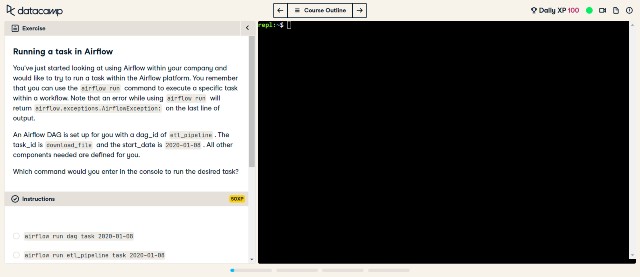
I found the approach to be more entertaining than video lessons. I can stay learning longer. Thus, Datacamp courses are beneficial for absolute beginners.
Once you have completed the courses, you can start working on real-world projects to strengthen your data engineering skills.
Nevertheless, if you have some experience in data science (i.e., have learned some Python and used a professional IDE before), I suggest you skip Datacamp and consider other alternatives.
The reason is that Datacamp’s lessons and quizzes are oversimplified. For example, in some lessons, Datacamp even provides the majority of the code.
This approach helps smoothen the learning for absolute beginners who have no programming experience. However, those who have the experience would find the lessons extremely dull. If that’s the case, you should select other courses instead.
Pricing
Datacamp uses a subscription model for its pricing structure. You will need to choose between the following plans:
- Premium – $12.42 per month, billed annually
- Teams – $25 per month
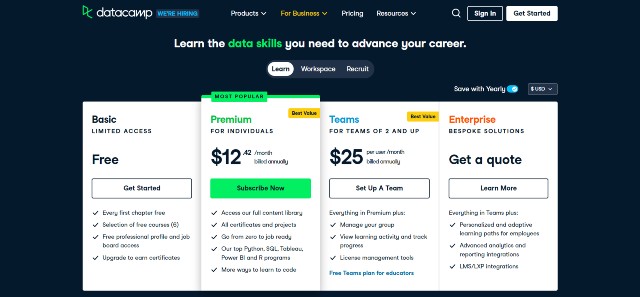
The Premium plan grants access to all data science courses and projects (330+ in total, including data engineering). Thus, this plan is an optimal choice for most learners.
Once you complete all content, your skill level will be lower intermediate, which is adequate for taking more challenging courses on Udacity and Coursera.
You can create an account and try some free lessons to test whether Datacamp is right for you.
Pros and Cons
Pros
- Extremely beginner-friendly (You can start coding right away without the need to install any IDE such as Pycharm or Jupyter Notebook)
- Entertaining interactive, bite-sized lessons
- Well-structured curriculum
- Learn anywhere, anytime through Datacamp’s top-notch mobile application
- Interactive skill assessments to test your skill level
- All-inclusive pricing: you can take all other data science courses on the platform besides the data engineering track
Cons
- Lessons, quizzes, and other assignments are oversimplified for students who have background knowledge.
- All Datacamp lessons are on its platform. Thus, students will need to learn to use the professional IDE later.
- No advanced content. You will need to buy more online courses to improve your skills further.
3. Dataquest’s Data Engineering Career Path
If you like Datacamp’s approach, but its courses somehow do not satisfy your needs, I suggest trying Dataquest. This online school utilizes the same interactive learning approach to teach data science.
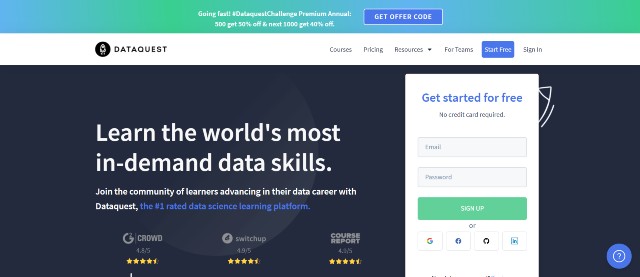
Course Content
This career path consists of six courses as follows.
1. Python for Data Engineering – The first course will equip you with the Python programming skills required for data engineering, including data types, conditional statements, loops, functions, OOP, data preprocessing, and many more.
2. Algorithm Complexity – The second course will introduce you to different algorithms and relevant concepts, such as time complexity, space complexity, or sorting algorithms.
3. Working with Data Sources – The third course will explain SQL in detail. You will understand how to perform essential operations and build and organize complex queries in SQL.
4. Production Databases – The fourth course will drill deep into PostgreSQL. You will get hold of how to extract data and manage the database.
5. Handling Large Data Sets in Python – Essentially, this course will teach you NumPy and Pandas, the core Python libraries used for data analysis. You will then be able to process data in large chunks.
Subsequently, the course will explain fundamental concepts of data structures, recursion, and trees.
6. Data Pipelines – In essence, you will learn to build data pipelines using Python. You will understand the concepts of functional programming and be able to perform pipeline tasks.
Dataquest’s lessons are generally similar to Datacamp’s in structure. You will read the short guidance and start coding right away without the need to install an IDE.
I have taken some lessons and found out they are beginner-friendly but less simplified than Datacamp. Students need to code from the start, which is excellent.
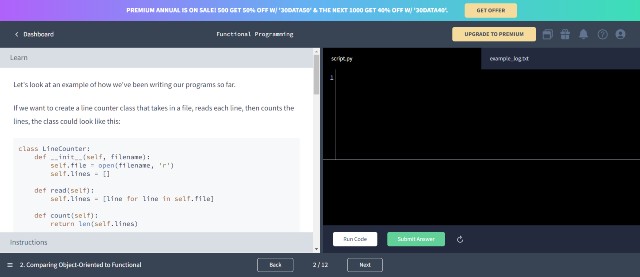
However, Dataquest’s data engineering career path has even less content than Datacamp. The platform now has no content on Apache Spark, big data concepts, and data warehouses.
Though Dataquest’s developers are assiduously adding new content, what is available only touches the basics. You will need to purchase additional courses if you want to pursue a full-time data engineering position.
This does not mean that Dataquest is not worth subscribing to. Dataquest is suitable for beginners who want to kickstart their data engineering journey, but once you are at the intermediate level, you just need to look elsewhere for more content.
You can create a free account to try the first lessons of all courses.
Pricing
Datacamp uses a subscription model. A yearly subscription costs $399 or $33.25 per month.
With this subscription, you can access all data science lessons, guided projects, and practice problems on the platform.
Pros and Cons
Pros
- Beginner-friendly and well-structured curriculum
- User-friendly platform
- Clear explanations of concepts
- Not overly simplified
- All-inclusive pricing
Cons
- Like Datacamp, Dataquest covers only the basics of data engineering. You will need more online courses to become a successful data engineer.
Advanced Data Engineering Courses
Below are advanced courses that students need to understand several programming and data science concepts (see above) before enrolling in.
4. Udacity’s Data Engineer Nanodegree Program
Udacity is a platform dedicated to improving students’ tech skills. With a solid curriculum and timely student support, I think very few platforms can offer better training than Udacity.
Thus, if you are looking for solid data engineering courses online, this Nanodegree program should be on the radar.
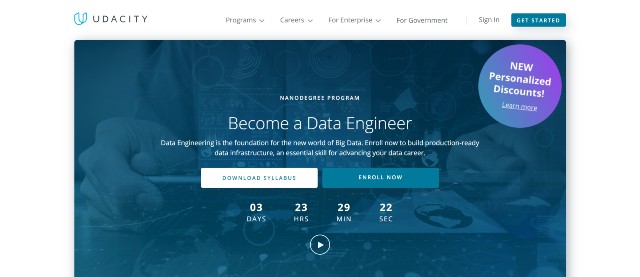
Course Content
Udacity’s Data Engineer Nanodegree program comprises five minor courses as follows.
1. Data Modeling – You will design and create data models (both relational and NoSQL) and use ETL to build databases in PostgreSQL and Cassandra.
2. Cloud Data Warehouses – The second course will widen your understanding of data infrastructure. You will then use AWS to create cloud-based data warehouses.
3. Spark and Data Lakes – The third course will go in-depth into the big data ecosystem. You will grasp how to use Spark to handle massive datasets. Subsequently, you will store data in a data lake and use Spark to query them.
4. Data Pipelines with Airflow – The fourth course focuses on building data pipelines with Airflow. You will monitor the pipeline by debugging, running quality checks, and tracking data lineage. Finally, you will completely automate a set of data pipelines you built.
5. Capstone Project – This capstone project will provide a valuable opportunity for students to obtain hands-on experience. You will utilize all the knowledge you learned from former courses to create a clean and robust database for others to analyze data.
In addition to quizzes, exercises, and assignments, all courses in the program have real-world projects that you can complete to strengthen your skills.
Specifically, you will be working on building a data infrastructure for a music streaming app called Sparkify. You will design data models, create data warehouses, and build data pipelines for them.
What makes Udacity shine above its competitors is its timely support. Once you enroll in the program, you will gain access to three types of support as follows.
- Mentor Support – You can email your mentor to ask any questions 24/7. You will receive a reply in less than an hour. Hence, you don’t need to wait for days or weeks like other online learning platforms.
- Project Reviews – This support alone is probably worth the tuition. You can send unlimited requests for experts to review your project. They will provide personalized feedback and inform you about best practices that help strengthen your data engineering skills.
- Career Services – The team will review your resume, LinkedIn profile, and Github portfolio to ensure that your job applications are up to standard and lead to numerous interview invitations.
Regarding the pace, you should spend 5-10 hours per week on the courses, and you will complete the program in 5 months.
However, the above pace is just a recommendation. Since the program is self-paced, you can then set your own schedule and pace. Just keep in mind that the more time you spend on the course, the more tuition you will pay.
Pricing
You will need to subscribe to the program to gain access to all course materials and support. The subscription costs $399 per month.
Alternatively, you can pay for 4 months at once and enjoy a 15% discount, lowering the monthly tuition to $339.
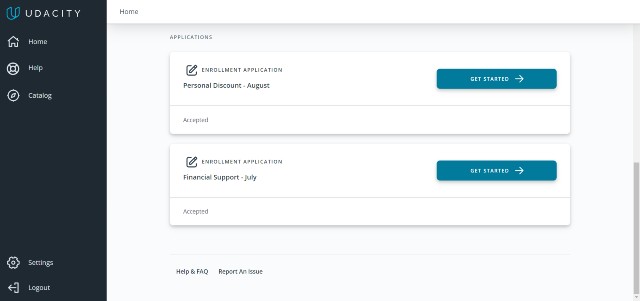
Nonetheless, Udacity frequently offers steep discounts (50%-75%) or personalized financial support (functions similarly to discounts, but you need to register for a free account).
With such discounts, it is possible to pay only $100 per month for this excellent program.
[sc name=”udacity” ][/sc]Pros and Cons
Pros
- Unarguably one of the best data engineering courses available online
- Learn from top-notch data engineers
- Easy-to-follow curriculum
- Excellent course materials (quizzes, exercises, and real-world projects)
- Timely student support + Unlimited project review requests
- All Udacity courses are frequently updated. Thus outdated content is rare.
Cons
- Expensive than most other data engineering courses
5. Preparing for Google Cloud Certification: Cloud Data Engineer Professional Certificate
This Coursera program from Google Cloud Training aims to provide high-quality prep training for those who pursue the data engineer certification exam.
However, the program is also highly beneficial for students who want to learn data engineering through the robust Google Cloud Platform (GCP). Thus, I decided to include them in this list.
Suppose you are familiar with Google’s cloud computing technologies or want to get the certification, this course is apparently worth your consideration.
Note: Besides the prerequisites above, you should have at least six months of experience in GCP cloud computing.
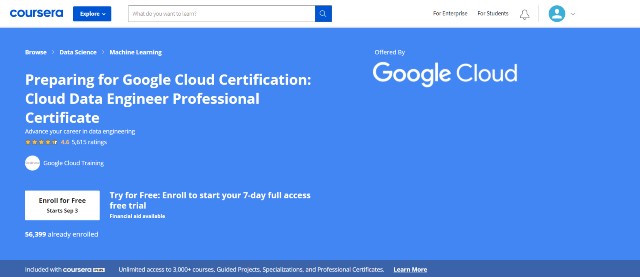
Course Content
This specialization consists of six courses as follows.
1. Google Cloud Big Data and Machine Learning Fundamentals – The first course will guide you through the capabilities of GCP in big data processing and providing machine learning solutions.
2. Modernizing Data Lakes and Data Warehouses – The second course will explain the use cases of data lakes and warehouses and the relevant solutions that GCP provides in detail.
In addition, you will understand the role of a data engineer and how efficient data infrastructure can benefit business operations.
3. Building Batch Data Pipelines – This course will explore ETL and ELT paradigms for data pipelines. You will perceive which paradigm is most suitable for each specific situation.
Subsequently, you will be introduced to data transformation technologies and learn to build data pipeline components on the GCP platform.
4. Building Resilient Streaming Analytics Systems – As demand for real-time data skyrockets, processing streaming data has become more popular than ever.
This course will teach you how to build streaming data pipelines on GCP and appropriately apply aggregations and transformations to the data.
5. Smart Analytics, Machine Learning, and AI – The fifth course explains how to incorporate machine learning into data pipelines on GCP to extract actionable insights from the data. You will also grasp how to use Kubeflow to productionalize machine learning solutions.
6. Preparing for the Exam – The last course is concise training to prepare you for the data engineer certification exam.
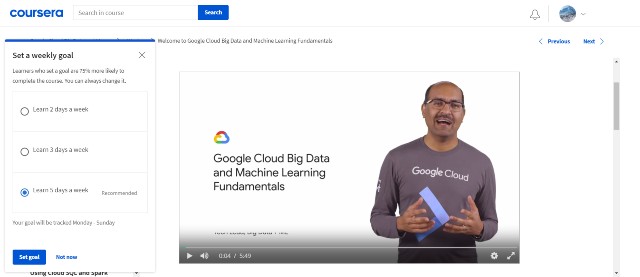
You should spend 4 hours per week on the program, and you will complete it in 4 months.
The tuition for this program is $49 per month for the full experience, which I recommend subscribing to because students who complete the program will receive a 20% discount on exam fees. Alternatively, you can audit the entire program for free.
Pros and Cons
Pros
- Best data engineering course for those who want to pursue Google’s data engineer certification
- Learn from leading experts at Google
- Well-structured and comprehensive curriculum
- Include excellent tips and guidelines
- 20% discount on exam fees after successful completion of the program
Cons
- The program lacks an update, which makes parts of its content outdated.
- Some reviewers complained that this program is not sufficient for students to pass the certification exam.
- Insufficient practice questions
- The transcripts are extremely difficult to read.
Related Courses
Despite taking these high-quality data engineering courses, many students still lack confidence in performing specific tasks or require more training on particular topics.
If you are one of them, you can visit the posts below to choose the right course to strengthen your skills. Unfortunately, I have not finished writing all the articles that I planned to do so. If there are new ones, I will update this section immediately.
Machine Learning – In these courses, you will learn how to build machine learning models, which is an excellent supplementary skill for data engineers, and a prerequisite for understanding deep learning and reinforcement learning.
Big Data – Coming Soon
Scala and Apache Spark – Coming Soon
Apache Kafka – Coming Soon
Apache Airflow – Coming Soon
Microsoft DP201 Certification – Coming Soon